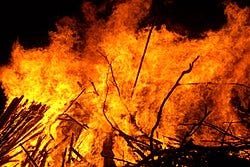Ice is melting, fires are burning up forests across the planet.
This week there was a very big report in the news. It is about how the whole planet has been getting warmer, and how to slow that warming down. The Intergovernmental Panel on Climate Change published a big report that shows what is happening now, and what is likely to happen soon, and in years in our future.
Fires are happening in places where the weather has been very dry and hot. Smoke covers places hundres of miles from the fires, making people sick. Floods are happening in places where the rain gets “stuck” over one area for hours. Ice is melting in places where it has been very cold. The seas and oceans are getting higher, making some islands smaller, and waves and storms bigger.
One very big story is how the Atlantic Ocean has had deep currents which are slowing down. This is because the melting ice is chilling down and changing the way the deep water moves. It has been a big conveyor belt of energy from warm waters in the south to cold in the north. This conveyor makes the European climate more stable, and a good place for people to live. This may be changing because of the melting ice. If a really big change happens, the conveyor belt may stop. The result could be a lot of ice in places that have been green and good for living in.
Civics Tuesday wants everyone to know that they have choices in how they can help the planet stay cooler, and also help people have good places to live. Every day, even children get some choices that can help. Waste is a big problem and energy is another. We can each choose to use what we need, share, and fix what is broken, instead of getting new or un-needed. Food and energy can be used, but not wasted. Only take food you need, and use the energy you need. Sometimes that means sharing a toaster with a sibling, sometimes it means turing off lights you are not needing, or wearing warmer clothing instead of heating your home more.
Remember to use your mind, and find new things you can do! There are many ideas you can try, and help others, too.
Aftermath of the fire in Lytton. Photograph: Cole Burston/For The Guardian
Wikipedia photo
References
https://www.theguardian.com/world/2021/jul/25/lytton-canada-heat-wildfire-record-temperaturesAtlantic
Energy Rebates & Discounts, ComEd
Food Emissions, CGIAR
Organic food scorecards, The Cornucopia Institute
Recycling Basics, Environmental Protection Agency
Instead of Waiting for Climate Heroes, Let's Look in the Mirror
A million bottles a minute, The Guardian
Are Insects The Food Of The Future?, WBEZ.org




